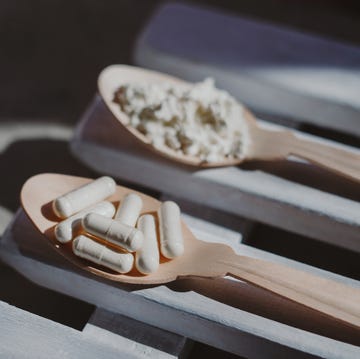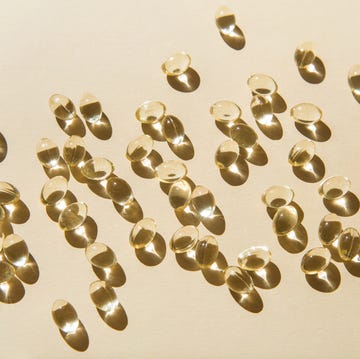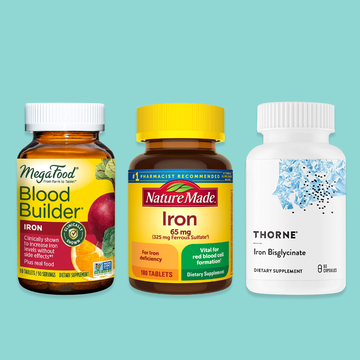When it comes to giving your body the key nutrients it needs, how often do you think about vitamin B12? Most of us don’t give this vitamin much thought, but it’s super-essential for maintaining good health.
Vitamin B12 (also known as cobalamin because it contains the element cobalt) is water-soluble. Its key functions include forming your red blood cells, metabolizing cells throughout your body, helping your nervous system operate smoothly and playing a role in DNA production, according to Mayo Clinic. You can see why it’s important to get enough of this nutrient!
For many people, eating right will provide a sufficient source of vitamin B12. “As a dietitian, I encourage food first,” says Bonnie Taub-Dix, MA, RDN, CDN, a nutrition consultant in New York City, podcast host and author of Read It Before You Eat It: Taking You from Label to Table. “You can consume vitamin B12 through eggs, dairy, fish and meat, or through fortified foods such as some plant-based milks, cereals or nutritional yeast.”
According to data from the National Institutes of Health Office of Dietary Supplements, men and women age 19 and older need 2.4 mcg of vitamin B12 per day. If you’re pregnant, you require 2.6 mcg daily, and if you’re breastfeeding, you should up your intake to 2.8 mcg.
Because it’s water-soluble, vitamin B12 doesn’t get stored in your body, so you have to make sure you’re getting your recommended requirement every day. This can be tough for people with certain health conditions that make it difficult to absorb vitamin B12. If you have an autoimmune disease like pernicious anemia or atrophic gastritis, you may become vitamin B12 deficient. Also, you may have difficulty absorbing vitamin B12 if you’ve had stomach or intestinal surgery or have Crohn’s disease or celiac disease. If you're vegetarian or vegan, it may be tough to meet your vitamin B12 needs, since most foods rich in B12 are animal-based.
Vitamin B12 deficiency symptoms
If you or your doctor suspect that you don't have enough vitamin B12, your physician can prescribe blood tests to check. According to Johns Hopkins Medicine, signs to watch for include:
- Muscle weakness
- Numb or tingling hands and feet
- Difficulty walking
- Nausea
- Reduction in appetite
- Weight loss
- Feeling irritable
- Low energy
- Diarrhea
- Smooth, tender-feeling tongue
- Fast heart rate
Can Vitamin B12 reduce your risk of disease?
Potentially. Research has found that vitamin B12 breaks down the protein homocysteine in your body. High levels of homocysteine can raise your risk of heart disease and stroke. Vitamin B12 is not routinely recommended for preventing those conditions, but some patients at particularly high risk may be prescribed vitamin B12 supplements.
Other studies show that high levels of homocysteine can raise your risk for Alzheimer’s disease, dementia and decreased cognitive function. Again, while there’s no routine recommendation for vitamin B12 supplements to reduce these risks, doctors may recommend them for some patients.
What is the best time to take vitamin B12?
First, talk to your health care provider if you have any risk factors for vitamin B12 deficiency, or if you think your diet is not providing you with an adequate amount of vitamin B12. If you have a severe deficiency, your doctor may recommend you get vitamin B12 shots which bypass your digestive system so the vitamin gets absorbed quickly. In most cases, though, vitamin B12 is taken by mouth in pill form.
Is there a best time to take it? The best time to take vitamin B12 depends on your routine because your body doesn't store it, so consistency is key. Some people say it boosts their energy, so they take it in the morning, but there's not much solid research to back up those claims for people who have normal levels of vitamin B12 in their body.
That said, you may want to try taking your supplement first thing in the morning before you've eaten anything. "B12 is a water-soluble vitamin, which means it’s best to take it with a full glass of water on an empty stomach," says Taub-Dix. "Forms of B12 that are chewable or sublingual (under-the-tongue) may enhance absorption."
Are there any precautions you should take with a vitamin B12 supplement?
You want to watch out for potential interactions with other medications you’re taking, such as these:
- First, a gastric acid inhibitor, which may be prescribed or taken OTC for GERD or peptic ulcer disease, can reduce vitamin B12 absorption.
- Also, metformin, which is prescribed for prediabetes and diabetes, can not only lower absorption, but lower levels of vitamin B12 in your blood.
- According to Mount Sinai, medications used to treat seizures, cancer, gout, cholesterol and to lower stomach acid may also reduce levels of vitamin B12 in your body.
Let your health care provider know about all the medications you take before you start vitamin B12 supplements to be sure they’re safe and right for you. Also, follow all guidance your doctor may give you regarding any other potential interactions.
The bottom line
Vitamin B12 supplements can be a great tool for your health – so if your doctor approves them, do what you can to make them part of your daily regimen. To remember to take the pills, “try keeping them near your toothbrush to incorporate them into your morning routine,” suggests Taub-Dix. Staying consistent could be the key to reaping the health benefits of vitamin B12.
Stefani (she/her) is a registered dietitian, a NASM-certified personal trainer and the director of the Good Housekeeping Institute Nutrition Lab, where she handles all nutrition-related content, testing and evaluation. She holds a bachelor’s degree in nutritional sciences from Pennsylvania State University and a master’s degree in clinical nutrition from NYU. She is also Good Housekeeping’s on-staff fitness and exercise expert. Stefani is dedicated to providing readers with evidence-based content to encourage informed food choices and healthy living. She is an avid CrossFitter and a passionate home cook who loves spending time with her big fit Greek family.













